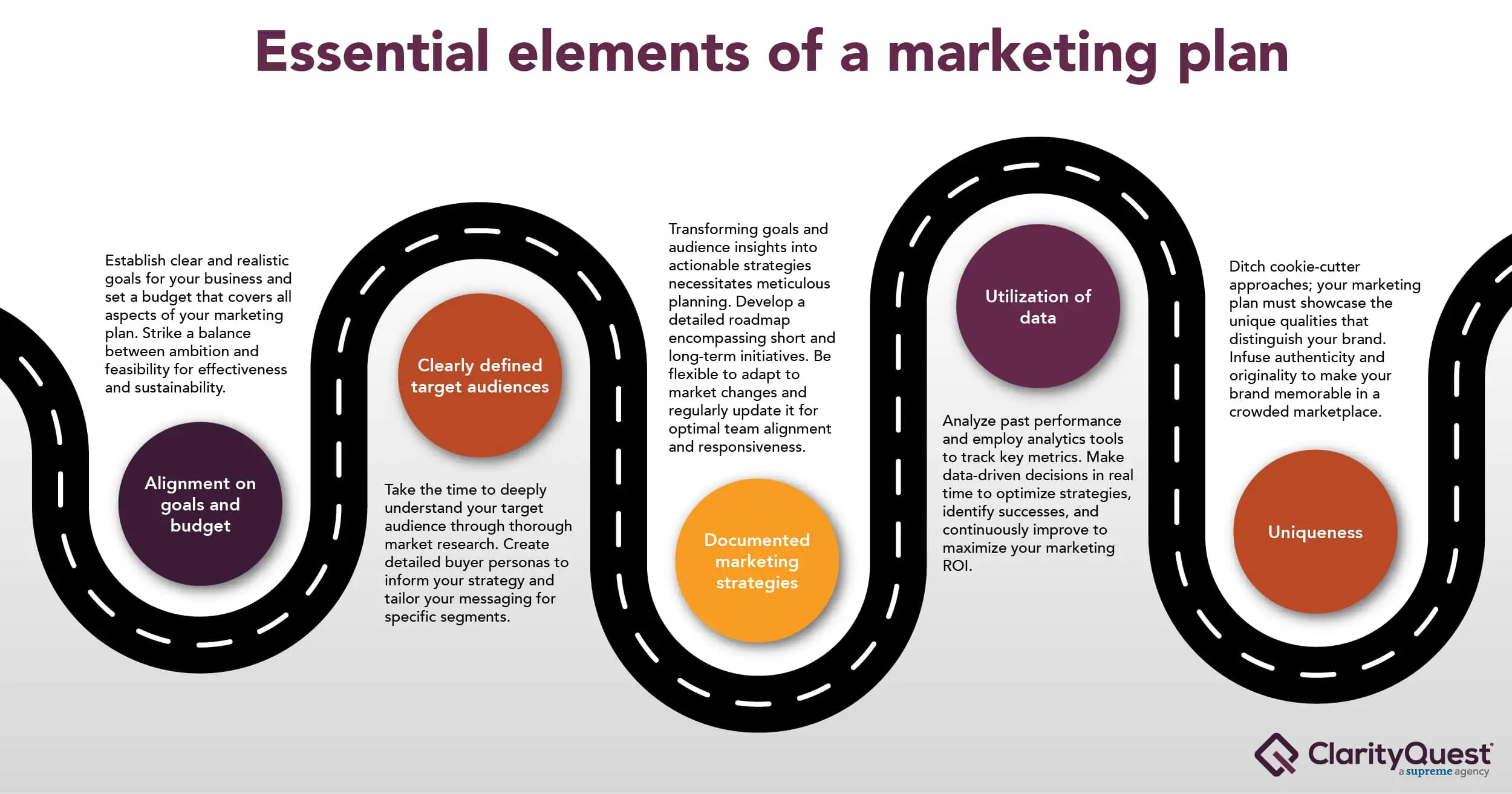Jumping straight into marketing campaigns without thoughtful planning will not yield the results you desire—detailed and strategic marketing plans are essential to reaching your goals.
However, not every marketing plan is built the same. While goals, products, and audiences vastly differ, all successful plans have a few things in common.
What are the essential elements of all marketing plans?
1. Alignment on goals and budget: A foundation for success
Before diving into the intricacies of strategic marketing plans, it’s imperative to establish clear and realistic goals. What does success look like for your business? Whether it’s increasing brand awareness, lead generations, or expanding market share, aligning your team on these objectives is the first step.
Equally important is setting a budget that aligns with your goals. Your budget should cover all aspects of your marketing plan, from advertising and promotions to your tech stack. Striking the right balance between ambition and feasibility is vital to an effective and sustainable marketing plan.
2. Understanding your target audiences: Precision in messaging
Successful strategic marketing plans hinge on a deep understanding of target audiences. Who are your customers, and what are their needs, preferences, and pain points? You’d be surprised by the number of companies who either can’t answer those questions in-depth or don’t unanimously agree amongst themselves.
Conduct thorough market research to create detailed buyer personas representing your ideal customers. This insight will inform every aspect of your marketing strategy, from content creation to channel selection.
By tailoring your messaging to resonate with specific audience segments, you increase the likelihood of capturing their attention and fostering meaningful connections. The more precise your targeting, the more efficient and impactful your marketing efforts will be.
3. Documented marketing strategies and roadmap: A blueprint for success
Turning goals and audience insights into actionable strategies requires careful planning and documentation. Create a detailed roadmap outlining the tactics and channels you’ll leverage to achieve your objectives. This roadmap should encompass short-term and long-term initiatives, allowing for flexibility in response to changing market dynamics.
From content calendars and social media schedules to product launches and promotional events, having a documented plan ensures everyone on your team is on the same page. Regularly revisit and update your roadmap to adapt to shifting priorities and emerging opportunities.
4. Leveraging data and insights: Informed decision-making
Data is a powerful ally in the world of marketing. Utilize past data to understand what’s working and what’s not and use it to drive your marketing plan forward.
Once in place, use data analytics tools to gather insights into the performance of your campaigns. Track key metrics, such as conversion rates, customer acquisition costs, and engagement levels, to evaluate the effectiveness of your strategies.
Data-driven decision-making allows you to optimize your marketing efforts in real time. Identify what’s working well and what needs adjustment, enabling continuous improvement and maximizing the return on your marketing investment.
5. Uniqueness: Tailor your plan to your company’s DNA
Cookie-cutter plans won’t get you the results you want—your marketing plan should reflect the unique qualities that set your company apart from the competition.
Whether through innovative lead generation campaigns or content curated to your target audience, infuse your marketing plan with elements that make your brand memorable. Authenticity and originality are the keys to standing out in a crowded marketplace.
Proven healthcare, biotech, and tech marketing plans
We know there’s no one-size-fits-all solution to marketing plans, which is why we operate under a “choose your marketing adventure” approach.
If your organization needs help with your go-to marketing plan, consider working with an experienced healthcare marketing agency.
Check out how one company leveraged a marketing plan and generated 1,300+ marketing-qualified leads.



